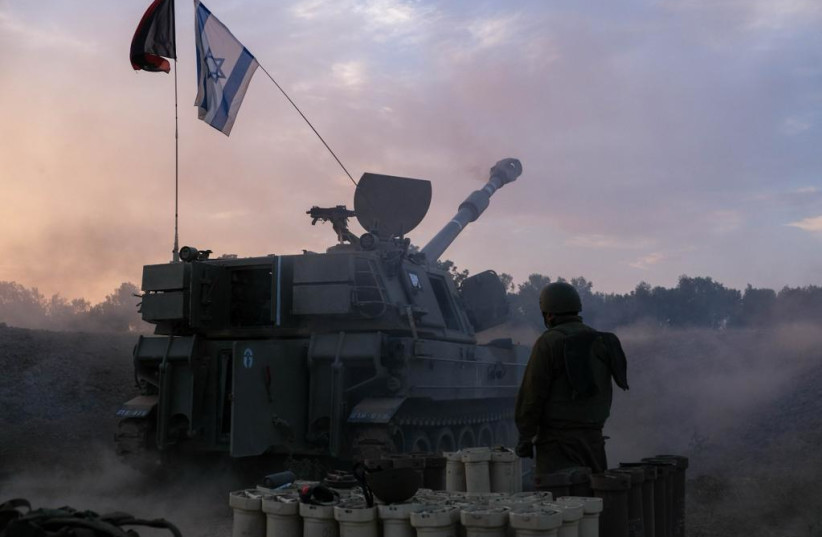The Defense Ministry is preparing for the second month of fighting. The war against Hamas began on October 7 and is now on its 27th day.
"The mission of the Defense Ministry is to allow breathing space and functional continuity for the IDF and the security forces to win in an ongoing multi-arena campaign, and to support the war effort on the civilian home front,” Director General of the Defense Ministry, Major General (Ret.) Eyal Zamir said on Thursday.
He and top officials provided an insight into the war so far and also what is being prepared for the next round. “All employees and employees of the Defense Ministry are mobilized to work around the clock. The IDF and the security establishment have all the capabilities and means to win the war,” Zamir said.
The Ministry is tasked with a plethora of work during the war, everything from making sure the people evacuated from almost 100 communities in the north and near Gaza are provided for, to repairing areas on the border, acquiring defensive gear, shelters and more munitions, to planning for the future. The Ministry noted that more than 3,000 tons of combat equipment have been brought to Israel on cargo planes and ships. 100 flights of cargo planes have been made and 5 ships have been used. The equipment involves vehicles, ceramic plates for soldiers, and other systems.
“The Defense Ministry is preparing for the beginning of the second month of fighting, with the overarching goal being to allow breathing space and functional continuity for the IDF and the security forces, and support for the war effort on the civilian home front,” the Ministry noted in a statement.
The focus is on acquiring what can be acquired from Israeli industries. Israel has three large defense companies, Rafael, IAI and Elbit Systems, and it has numerous small companies. There are also other aspects, such as acquiring vegetables and uniforms from Israeli businesses. Billions of shekels are being spent. The US is also considering financial support for Israel during the war, to the tune of some $10 billion.

The Ministry said that it has budgeted 3 billion NIS so far and that this has supported 651 factories and 57,000 workers. Overall 8,500 vehicles have been paid for, as well as 4,000 buses, 2,000 trucks and other types of moving vehicles. Construction companies are also involved, and there are repairs to communities on the border, such as those attacked by Hamas near Gaza. In addition defense shelters and other sites have to be provided.
The Ministry is also working toward the 30th day of commemoration for the fallen. This includes 394 members of the security forces who have fallen in the war, including members of the Shin Bet and 58 police officers. Many of these personnel were killed on October 7. It has taken time to have funerals for all of them, the first week saw dozens of funerals each week. There are so many who were killed that 146 cemeteries included the graves of the fallen. In addition 712 IDF members have now been recognized as disabled due to injuries. Thousands of people were injured during the Hamas massacre on October 7. Many were released the first day from the hospital, but many had serious injuries as well. In addition there are 125,000 people evacuated from almost 100 communities, including the cities of Sderot and Kiryat Shmona, who are staying in 359 hotels and guest houses.
Israel talks about the spirit of this war and the goal of victory. However, the current task of preparing the economy for a kind of total war is a herculean effort. On the positive side Israel has the massive defense industries and indigenous abilities to do this, a produce of 100 years of the Zionist movement and the state working towards these goals. The ministry is working 24/7 its officials say. They are also frequently in contact with western counterparts, particularly the Pentagon, US Secretary of Defense Lloyd Austin and CENTCOM.
The task of preparing for this long war is complex. It also involves acquiring and distributing 7,000 small arms to the local security of many communities. There is a huge demand for sidearms and rifles to protect communities. Meanwhile, cargo flights are arriving daily to Ben-Gurion and other airports. The country also has to increase shelters for people in case of widening conflict. Around thirty-five percent of people lack shelters, and some have only older shelters in their buildings or communities. This is a problem in places like Ashkelon and the north for instance.
Unique new defense systems
Meanwhile, Israel is also investing in unique defense systems. This includes leveraging hi-tech and artificial intelligence and also acquiring more counter-drone systems. Companies such as Smart Shooter and Xtend were mentioned in the meeting. Israel has been investing in more unmanned systems already, such as drones, robots and various other systems that can help create drone swarms and utilize AI. There are also precision such as the Iron Sting mortar. The Ministry’s presentation shows that the country has many capabilities and was able to switch to a war economy quickly. However, there are many challenges ahead in a long war in which many reservists are called up and many people are now evacuated from the borders. Also, every plan faces challenges when it has contact with the enemy, Israel has not had contact with the enemy and the plans of the last decades require a learning curve.
